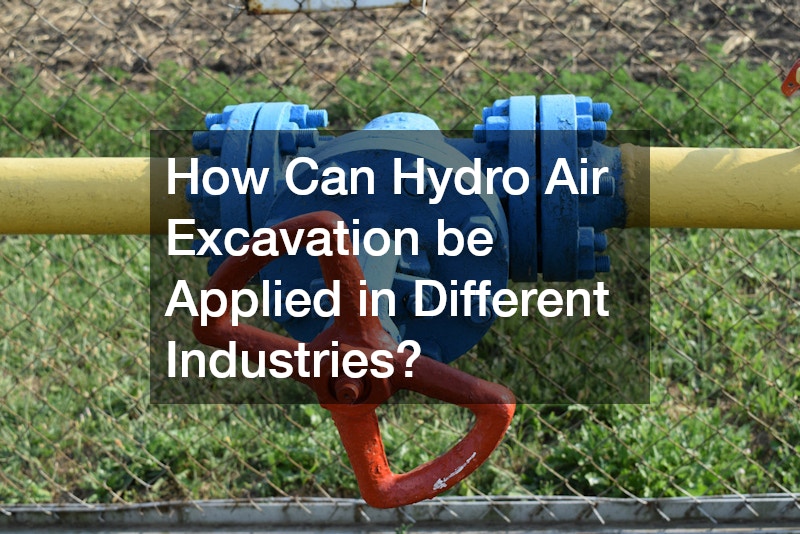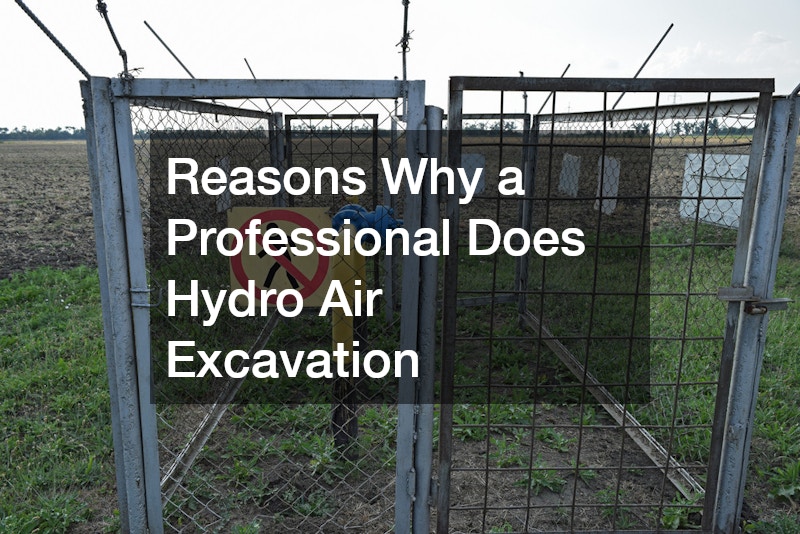Hydro air excavation is a modern and innovative excavation technique that uses pressurized water and air to remove soil or debris. This article explores the reasons professionals prefer hydro air excavation over traditional methods, delving into its benefits in terms of safety, efficiency, cost, and environmental impact.
The significance of hydro air excavation lies in its precision and reduced risk of damage to underground utilities and infrastructure. As such, this method has gained popularity in sectors like construction and utilities, where accuracy and safety are paramount.
Whether you are involved in a large construction project or a small-scale utility installation, understanding the advantages of hydro air excavation can guide informed decision-making. This article aims to highlight key aspects of this technique and why hiring a professional service is crucial.
What is Hydro Air Excavation?
Definition and Process
Hydro air excavation is a process of using highly pressurized water to break up the soil, followed by a powerful vacuum system that removes the debris. This method is considered non-destructive and allows for precise excavation in sensitive areas.
The technique utilizes a sequence of water and air to accomplish its tasks, making it safer than traditional digging methods, which might damage existing underground structures. This precision minimizes the risk of accidental damage to underground utilities such as water lines and electrical cables.
Tools and Equipment Used
The equipment used in hydro air excavation typically includes hydro vac trucks that combine water and air technology. These trucks are versatile and can operate in confined spaces, making them suitable for urban and rural settings alike.
Professionals employ nozzles specially designed to control the flow of water, allowing for precise excavation without causing unnecessary disruption or damage. Advanced vacuum systems then efficiently remove the loosened debris, leaving a clean and safe worksite.
Why is Hydro Air Excavation Preferred Over Traditional Methods?
Safety Benefits
The safety aspect of hydro air excavation lies in its non-destructive nature, as it reduces the likelihood of accidental utility strikes. This is crucial in urban areas where underground infrastructure is dense and at risk of substantial damage from traditional digging methods.
By using water and air, this method minimizes the physical impact, preventing injuries and accidents that are often associated with manual or mechanical digging tools. This not only protects workers but also the public and the environment from potential hazards.
Environmental Impact
Hydro air excavation is considered more environmentally friendly compared to conventional excavation methods. It reduces soil disruption, preserving the natural state and preventing erosion or other detrimental ecological effects.
The reduced noise and lower emissions from hydro vac trucks make this method more acceptable in urban settings, where environmental regulations are stringent, and community standards need to be upheld. This approach aligns with sustainable practices increasingly valued in industries.
How Does Hydro Air Excavation Improve Efficiency?
Time Optimization
Hydro air excavation significantly reduces project timelines by eliminating the need for extensive manual labor and mechanical excavation equipment. The speed and precision of the water and air technology streamline the entire process, reducing time spent on site preparation.
Professionals are adept at deploying this method in various conditions, which minimizes downtime due to weather or site constraints. This results in quicker project completions, benefiting stakeholders by meeting strict deadlines.
Precision and Accuracy
One of the standout advantages of hydro air excavation is its ability to provide precision and accuracy in digging. This level of control ensures minimal impact on existing structures and utilities, reducing costly repairs and downtime.
Professionals equipped with hydro vac technology can accurately target excavation sites and adapt to various soil types, avoiding unnecessary destruction and maintaining the integrity of nearby structures. This capability is particularly beneficial in urban areas where space is limited and congestion is high.
What Are the Cost Implications of Hydro Air Excavation?
Costs Vs. Traditional Excavation
While hydro air excavation may have higher initial equipment and operating costs, it compensates with substantial savings over traditional methods. The reduced risk of damage and fewer labor requirements lower indirect costs and improve overall efficiency.
Professionals argue that the long-term savings outweigh the upfront expenses due to the method’s reliability and effectiveness. This balance makes it a preferred choice for projects with tight budgets and long-term operational visions.
Long-term Financial Benefits
The precise nature of hydro air excavation equates to fewer repairs and maintenance costs over time. This reduces the likelihood of project overruns and associated financial penalties often seen with traditional digging methods.
Investing in hydro air excavation reduces risks, which translates to lower insurance premiums and financial liabilities for companies. Therefore, stakeholders see significant return on investment from improved operational efficacy and reduced financial exposure.
How Can Hydro Air Excavation be Applied in Different Industries?
Construction and Utility Sectors
Hydro air excavation is widely used in the construction and utility sectors to safely expose underground utilities without causing damage. The process allows for the precise digging needed for critical infrastructure installation and repair.
Professionals utilize this method to handle excavation in confined spaces, making it ideal for urban development projects. This adaptability ensures minimal disruption to existing transportation and utility networks while maintaining project timelines.
Emerging Applications
New industries are discovering the benefits of hydro air excavation, from telecommunications to environmental management. The method’s precision supports projects involving fiber optic installations where traditional excavation methods pose a risk of damage.
The practice is also gaining traction in the agricultural sector, where soil preservation is critical for sustainability. By minimizing soil disruption, hydro air excavation protects agricultural land integrity and boosts productivity.
.

